When Archie Naughton was two, he had meningitis, pneumonia, and septicaemia, and nearly died.
"He didn't, thank God, but he was left with this kind of a limp, and he was having occupational therapy and physio, and he improved greatly," his mother Paula says.
"We all assumed that was because he had meningitis and, you know, when you're told your child might die, you do a lot of bargaining with God. 'Let them walk.' When they walk, 'don't let them be deaf, don't let them be blind,' all those things, you know."
Nonetheless, at the age of six, Archie still couldn't put his heel to the ground and his GP recommended a specialist at the National Rehabilitation Hospital in Dún Laoghaire.
"In the meantime, Isaac, who was two, was struggling to get off the floor, though that wasn't a problem for his twin, George," Paula explains from her home in Roscommon town. "So the consultant said, 'Look, why don't you bring Isaac as well, and I'll have a look at him too.'"
"When he came into the waiting room, all five of us were obviously there, and I saw his face, and I was like, something's really wrong. I just thought, well, George jumps up and Isaac is a bit lazy. That's what the public health nurse said. But I knew by the poor consultant's face that we could have a big problem here.
"That was on a Tuesday and they had a blood test on Thursday."
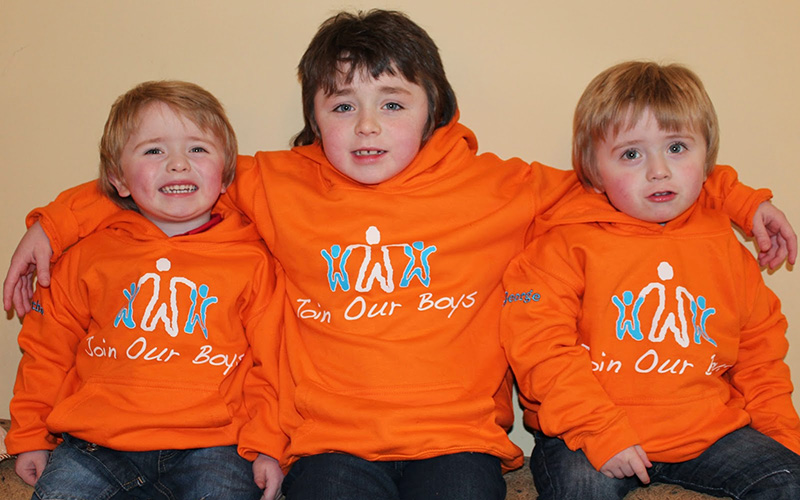
Archie, George and Isaac Naughton.
The doctor phoned Paula on the Friday morning and asked to meet at 2 pm that day.
"I had had this very interesting conversation the night before, because I did exactly what the consultant told me not to do, of course," she says.
"I Googled, and it was like a checklist. I said to my husband Padraic in the kitchen, 'We're in big, big trouble. I think the boys have got this thing called Duchenne muscular dystrophy.'
"I explained it to him, and my husband looked at me and said, 'God would never do that to us. We're both nurses. We've spent our lives looking after other people.' I've worked in paediatric oncology, and Padraic said, 'You've helped loads of kids. Like, why would why would God do that?' I said, 'I've got no idea, Padraic, but these are the facts as I see them.' Unfortunately, Dr. Google was right."
The diagnosis was devastating. Duchenne is caused by a rare genetic mutation and leads to the loss of muscle function. Not just those that control mobility, because it also affects the most important muscle of all - the heart. Most who have it will die before they reach their late teens, though children as young as six can die from it.
"What makes it crueller is that these children can do all the things that a healthy child can do, which is often why, in a child like Archie, it was never picked up on," Paula says.
"They learn to do all of those things, and then it's almost like from the feet up, those skills are lost. So what happens is, usually around age six, seven, they start falling over. They find it hard to run, to hop, to skip, they'd be slower than their peers, obviously, on the sports pitch, getting up off the carpet. Then it just affects the rest of their body.
"Archie was quite unique. He was still using a manual wheelchair at 16, doing wheelies. He was still walking until he was 12. Isaac stopped walking when he was eight, and he and George have been much more physically disabled by Duchenne faster. But what we didn't know was how quickly Archie's heart would fail."
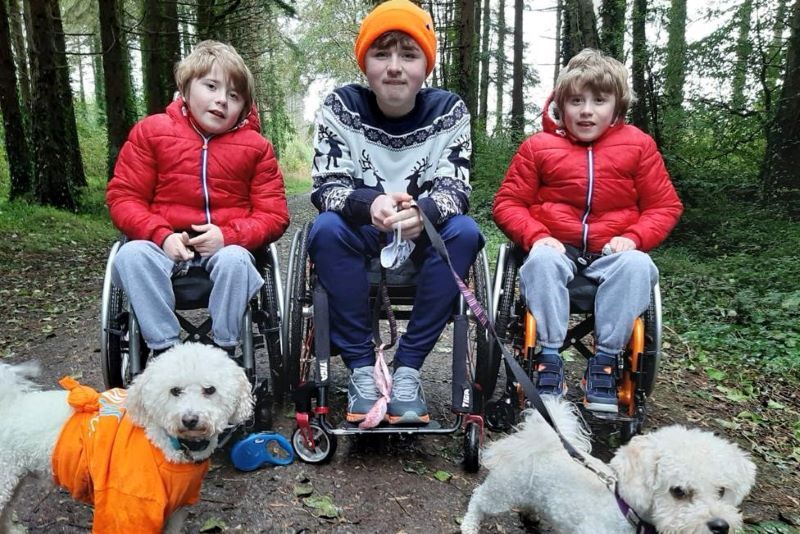
Archie, George, and Isaac Naughton.
Paula bravely recalls the events of July two years ago.
"Archie started being sick," she says. "He was vomiting for a month and he had lots of investigations. I remember asking them if it could be his heart and they said no. Two weeks later, he ended up in coronary care and, because he was 16, he had to go to adult coronary care, which was an issue for me.
"Then he was transferred to the Mater Hospital and they were going to fix his problem. But when he got there, we were told that he was going to die.
"There was nothing they could do for him, and that he would have to stay in hospital to die."
Paula wanted to get him home and, after dogged insistence in the face of initial resistance, finally got agreement on that to happen on the Thursday morning. On the Tuesday, when Padraic nipped out for coffee, Archie looked at Paula.
"Mummy, I'm really, really sorry, but I've got to tell you something," he said.
"That's fine. Tell me, what is it?" Paula said.
"I'm really, really sorry. I think I'm gonna have to die," Archie continued. "I'm really sorry, because I know that's going to make you very sad."
Paula was calm. "Oh, gee, I think you have to do what you have to do, and you mustn't worry about the rest of us. That's when he said to me, 'but Mummy, if I die, you have to promise me that you will keep trying to find something for the boys, because I don't want them to suffer like this.'
"I'm obviously very biased, because I'm his mother, but there was just something about him. There are people that still talk to Archie and ask Archie to help them and believe that he's still helping them. A good few of his friends reckon that he got them through the Leaving Cert.
Sadly, Archie didn't make it home. He was a sports fanatic, and even played wheelchair basketball and trained as a rugby coach. His room had been readied, gutted by the neighbours, and painted in Chelsea blue, but at 2 am on the morning he was due to go home, Archie died.
"I was convinced he really didn't want his brothers to see him," Paula says quietly.
"The name Archie means courageous and truly bold, as in brave, and he really lived up to it. He was well named."
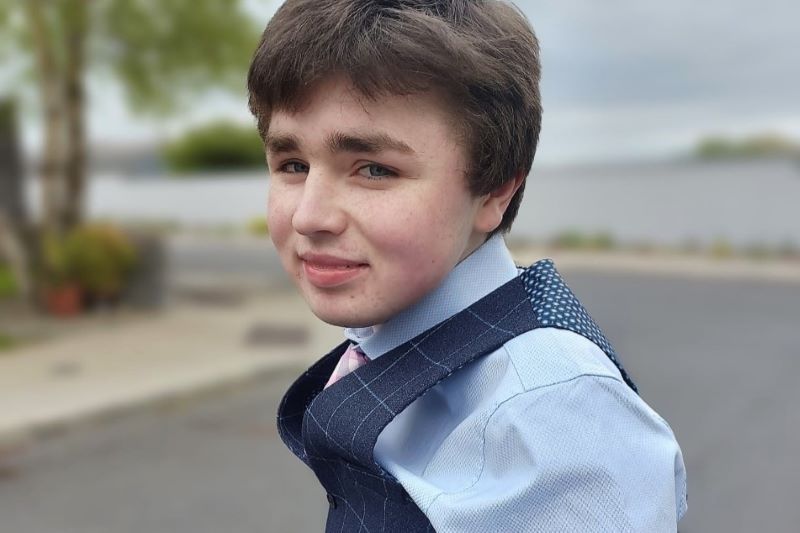
Archie Naughton.
Isaac and George took the news equally bravely. "They were expecting to see Archie, and instead, it was us walking up to tell them that their brother had died," Paula says. "They were just 12 years old, just by a few weeks.
"But again, they're so contained.
"It's really hard to describe them - they're just, they're very mature. I think because they have each other, the way they have processed their grief is very unusual. We've been very lucky that LauraLynn hospice has been providing music therapy for them, but what happens in music therapy stays in music therapy. We talk about Archie all the time. They say things like, 'well, Archie will help us do that.'
"They're very accepting of the situation, because I suppose they have no other choice. They know that if they did have a choice, it would be to sit around all day crying. But they also know that that isn't going to help them, that isn't going to bring Archie back, and it isn't going to help them in their situation. So they still talk about him in very loving terms."
The boys have been accepted on a new clinical trial in the United States for a drug that cannot cure Duchenne, but can mitigate the effect it has on the heart, and hopefully prolong their lives.
That said, the family has to raise €650,000 to participate, and has set up a GoFundMe. Donations already stand at almost €290,000, and they also ran a Christmas raffle to raise funds.
The fact the community has rallied around is no surprise. In 2014, when the family home became unsuitable for the Naughtons' needs, the community offered to build a new one for them. Paula and Padraic wouldn't hear of just being given it for free, so a trust was established, and the boys can live there for the rest of their lives.
"We don't have anything to do with the money, which is how we wanted it,' Paula says. 'This house was built in trust, and we're going to leave it to an organisation, an appropriate one, so that it can be used in the future. So we actually live in what is known as the Join Our Boys House that is managed by three trustees, because we felt at least then, some good has come out of this mess.
"The boys have an environment they can function in but also, in the future, there's some kind of legacy that will help other families. If we didn't do this, we would be, excuse my French, in s**t alley now, because there would be no space in our home."
The boys are in good spirits, even though Isaac has recently returned home from Crumlin Hospital, where he had spinal fusion surgery. Paula laughs as she tells me she was disorganised for Christmas, which was always a special time because Archie's birthday was December 17.
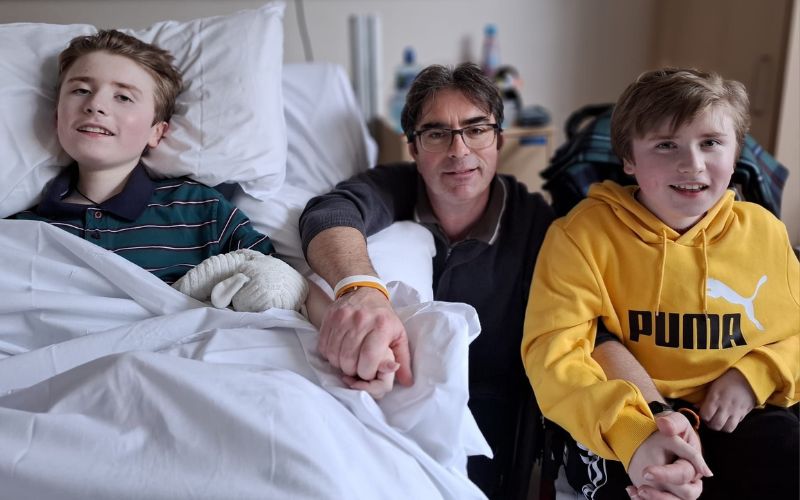
Isaac and George Naughton with their dad Padraic.
"They've been used to phenomenal Christmases," she says. "[This year] I said to them, you just need to let me know what you'd like, just so at least I can get you a gift. They said to me, 'Mummy, this is ridiculous, there are children being killed in Gaza, people haven't got any money, and you're going to go and buy a load of sh**e, and we don't actually need it.'
"I looked at my husband and said, 'who's actually running this house' But they're right."
Paula ('I'm a proud Welsh woman') and Padraic met in Muswell Hill in London 30 years ago when both were training to be mental health nurses.
"I thought he was very conceited," she laughs. "There were only ten of us in this class, including two Irishmen, and the girls were falling over these two Irishmen, and they said to me, 'oh, they're lovely,' and I said, 'they're really annoying!' Of course, they were lovely, but they were both very handsome, you see, and I was like, 'oh, seriously, I don't have to look at these two for 18 months, do I?'"
In 2005, by then a couple, they came back to Roscommon to help look after Padraic's parents. The plan was to spend six months, with the promise of two Labradors when they returned to England, but they never went back. Both now work for the HSE as child mental health nurses, but Paula believes they would get more help from the NHS and UK social services, than they do here.
They need a new van because their current one has a securing mechanism for just one wheelchair, but even with VRT and VAT discounts, it would still cost €74,000, which they don't have. Amazingly, the grant is per vehicle, whereas in the UK, it would be per child, and insurance and diesel are free there.
Every day brings challenges. "Essentially, they need help with everything," Paula says. "George can still feed himself, whereas poor Isaac had the surgery and has been kind of really laid up. He lost a lot of weight, which means he lost muscle mass. He can't feed himself now, so we've actually got the physios coming to try some muscle stimulation.
"It's a terrible analogy, but it's like having a very tall toddler, with a very high intellect, which is so crushingly heartbreaking, because I look at them and I wonder what could have been."
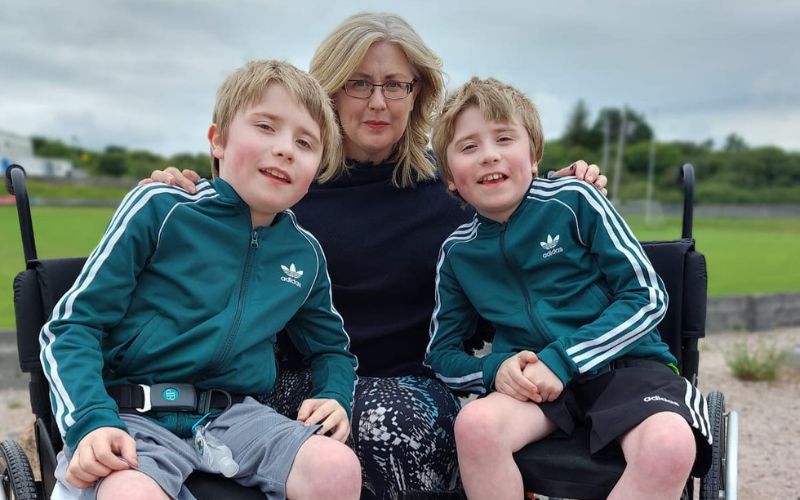
Paula with twins George and Isaac.
The boys get ten hours a week from Roscommon Home Support, mostly spent in the therapy pool, which they use at least five days a week, but Paula is honest about the impact on her and Padraic's lives.
"We're permanently knackered," she says. "Mentally, physically, emotionally. That was before Archie died. Do you know what, though, I think we do very well. We both work. We have to work, we have a mortgage. We have to pay our bills. We have to keep the house because, whichever way this goes, if we get a miracle, we'll all be going home, and if we don't get a miracle and one of us is still alive, we have to go home."
Please Share; IT IS FREE 🧡 Thanks to our brilliant supporters, we now only need 74,518 Gorgeous Souls to donate €5.00...
Posted by Join Our Boys Trust on Sunday, January 12, 2025
"So far, the boys have had three doses of the new drug. Isaac just had a nine-hour surgery and his heart is really good," Paula says. "I'm sure his heart is good because he's already had some of this drug."
For now, they need to raise the money to keep going, and it's not hard to understand why.
"These children are an absolute gift and a privilege," Paula says. "We're very lucky. We'd never change them. We've had some amazing teachers, in universities and colleges and in all kinds of clinical areas, but these three have been our greatest teachers."
If you would like to donate, visit the Save George & Isaac's Heart page here on GoFundMe. For more on the boys, click here.
*This article was originally published on Evoke.ie.
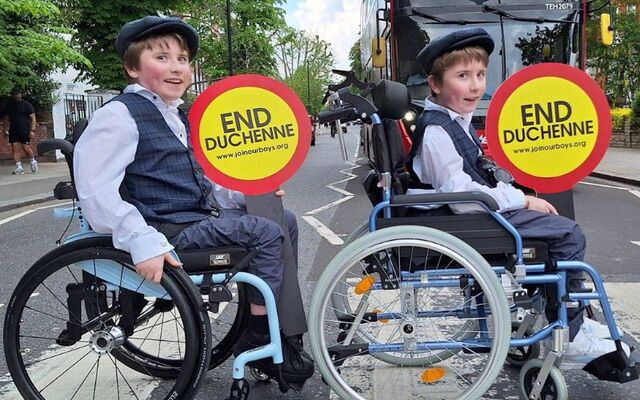



Comments